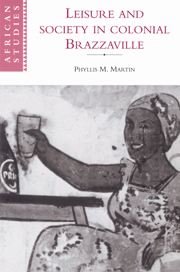Book contents
- Frontmatter
- Contents
- List of plates
- List of maps
- List of tables
- Acknowledgements
- List of abbreviations
- Introduction
- 1 An African crossroads, a frontier post and a colonial town, c. 1880–1915
- 2 Taking hold of the town, c. 1915–1960
- 3 The emergence of leisure
- 4 Football is king
- 5 About the town
- 6 Dressing well
- 7 High society
- Conclusion
- Notes
- Bibliography
- Index
- Titles in the series
1 - An African crossroads, a frontier post and a colonial town, c. 1880–1915
Published online by Cambridge University Press: 09 November 2009
- Frontmatter
- Contents
- List of plates
- List of maps
- List of tables
- Acknowledgements
- List of abbreviations
- Introduction
- 1 An African crossroads, a frontier post and a colonial town, c. 1880–1915
- 2 Taking hold of the town, c. 1915–1960
- 3 The emergence of leisure
- 4 Football is king
- 5 About the town
- 6 Dressing well
- 7 High society
- Conclusion
- Notes
- Bibliography
- Index
- Titles in the series
Summary
As it was the impoverished capital of an imperial backwater, Brazzaville's initial development was slow and uneven. The great majority of its inhabitants lived in rough huts near their workplaces, and suffered from chronic food shortages and erratic employment. These circumstances had a great deal to do with colonial policy, the disruption of indigenous economies by concessionary companies and river steamers, and local responses to foreign occupation.
Many of the labourers on the waterfront or on construction sites were young migrant workers sent by their family heads to earn cash. Some had come on their own account to earn money for material goods and marriage payments. Also significant as an urban elite were foreigners, recruited by Europeans or drawn to the Central African capital by stories of opportunity. Arriving at the Pool, the French on the north side and the Belgians across the river at Léopoldville were in a region with no previous direct contact with Europe and with none of the trained auxiliaries indispensable to the functioning of capitalist enterprise and colonial rule. In the French case, lack of investment in education further retarded the training of local elites for several decades, so that West Africans as well as workers from coastal regions of Central Africa and from the French West Indies dominated skilled and semi-skilled jobs. These foreigners were also purveyors of new ideas on leisure. Some who stayed for extended periods or permanently, married local women or brought wives from their regions of origin.
- Type
- Chapter
- Information
- Leisure and Society in Colonial Brazzaville , pp. 12 - 44Publisher: Cambridge University PressPrint publication year: 1996

